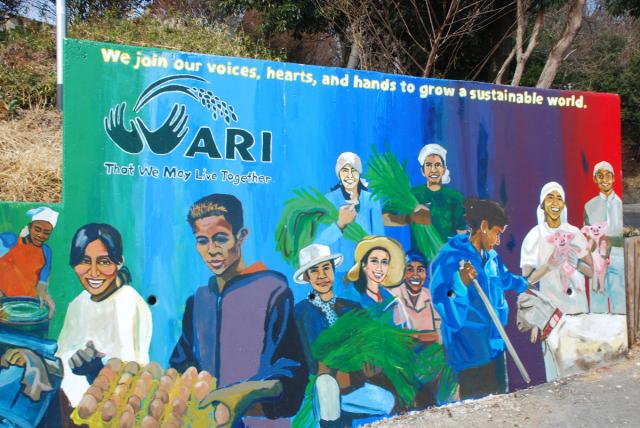The Asian Rural Institute in Japan is helping sustainable agriculture and Christian community go viral around the world.

In early February 2019, I had the opportunity to visit the Asian Rural Institute, a unique organization and United Church Mission & Service partner in Nasushiobara, Japan. Together with Patti Talbot, the General Council staff responsible for United Church partnerships in northeast Asia, I travelled an hour and a half north of Tokyo by train to visit the institute. Founded in 1973, the organization is related to the United Church of Christ in Japan.
With the motto “That we may live together,” the institute is a leadership development centre located on a six-hectare organic farm. Each year it receives 30 people who have been recognized as local community leaders in their home countries to participate in a nine-month course that focuses on sustainable agriculture, servant leadership, and community building.
Since the time it opened, the institute has trained more than 1,350 graduates from 57 countries, with a majority from Southeast Asia and Africa. With an international mix of students and staff, the operative language is English.
The Asian Rural Institute is in an area of east Japan affected by the “Triple Disaster” of March 2011: a devastating earthquake, a huge tsunami, and the meltdown of the Fukishima Dai-ichi nuclear plant. The institute has a radiation testing centre that continues to regularly check local soil samples, native plants, and crops for radiation levels. The centre has found that while the farm’s soil has an elevated radiation count, the oil pressed from soya beans grown on the farm does not. It is safe for consumption. In addition, when the soya cake, produced as a side product of the oil pressing, is mixed with organic fertilizer for the farm’s fields, it actually reduces radioactivity in the soil. Eight years after the 2011 nuclear disaster, most crops grown on the farm now are considered safe. Certain plants, in particular wild mushrooms — that were considered a regional delicacy — continue to have very high levels of radiation.
The United Church has contributed to various projects at the institute over recent years, using legacy funds dedicated to ministry and mission in Japan. This includes contributions toward the purchase of a harvesting machine, a refrigerator truck, and the refurbishing of the women’s dormitory. More importantly, United Church Mission & Service has supported study scholarships enabling students from many countries to learn the importance of sustainable agriculture and living in community.
While at the Asian Rural Institute, I was impressed with the interconnectedness of the staff and students with the sustainable agriculture practices that are taught. Staff speak about integration of “food life.” This is evident as crops from the farm’s fields and the meat from its poultry and pig operations are harvested, prepared, and then cooked by groups of students and staff. Meals are eaten in community when staff and students — and visitors like me — gather in the large Koinonia Dining Hall and Social Centre. Through the sharing of meals and daily morning worship, a sense of community is built and celebrated.
—John Durfey is member of Port Nelson United Church in Burlington, ON who represents The United Church of Canada on the “Inter-Board Shadan,” a mission foundation in Japan.